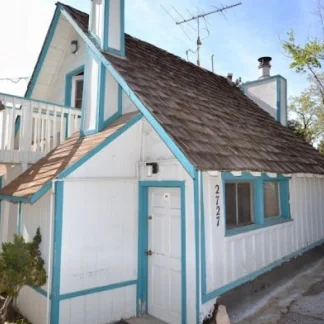Above It All Treatment
Above It All Treatment Center offers inpatient treatment for individuals with al...
Pine Ridge Treatment Center is a drug treatment facility located in Running Springs, California that provides services to young adults and adults struggling with addiction. This drug rehab facility offers inpatient care, intensive outpatient programs (IOP), outpatient treatment, and aftercare support.
Inpatient clients live on campus and attend individual and group therapy sessions while following house rules. A 12 Step program is included in group therapy, for residents to share their experiences with others. The house provides semi-private rooms along with communal living areas for residents to gather and enjoy each other’s company.
The IOP offers a step-down in care to allow participants to gradually return to their daily lives. Patients in this program continue individual counseling and a 12 Step program full-time but return home at night.
Outpatient treatment is more flexible than the IOP. Clients continue to attend treatment but at part-time hours. This program is for those who are ready to return to work/school.
Aftercare support provides relapse prevention resources for alumni. This includes recovery education, support groups, continued therapy, and referrals to other services.
Pine Ridge Treatment Center accepts Medicare and private insurance, including Aetna, Amerigroup, United Healthcare, Ambetter, and BlueCross/BlueShield. For out-of-network benefits, please contact your provider to verify coverage.
Contact us for more information: (909) 867-7027

Connect with Pine Ridge Treatment Center by calling their admissions team directly.
(909) 867-7027 Website Get DirectionsThe Commission on Accreditation of Rehabilitation Facilities (CARF) is a non-profit organization that specifically accredits rehab organizations. Founded in 1966, CARF's, mission is to help service providers like rehab facilities maintain high standards of care.
CARF Accreditation: Yes
Chemical Dependency is a disease that affects the entire family. Pine Ridge Treatment Center - Highland Drive offers counseling for family members as they break down the barriers of denial that insulate the individual and family from recovery. Pine Ridge offers family education with individual, group, and joint counseling sessions.
Group therapy is any therapeutic work that happens in a group (not one-on-one). There are a number of different group therapy modalities, including support groups, experiential therapy, psycho-education, and more. Group therapy involves treatment as well as processing interaction between group members.
In individual therapy, a patient meets one-on-one with a trained psychologist or counselor. Therapy is a pivotal part of effective substance abuse treatment, as it often covers root causes of addiction, including challenges faced by the patient in their social, family, and work/school life.
Group therapy is any therapeutic work that happens in a group (not one-on-one). There are a number of different group therapy modalities, including support groups, experiential therapy, psycho-education, and more. Group therapy involves treatment as well as processing interaction between group members.
In individual therapy, a patient meets one-on-one with a trained psychologist or counselor. Therapy is a pivotal part of effective substance abuse treatment, as it often covers root causes of addiction, including challenges faced by the patient in their social, family, and work/school life.
In individual therapy, a patient meets one-on-one with a trained psychologist or counselor. Therapy is a pivotal part of effective substance abuse treatment, as it often covers root causes of addiction, including challenges faced by the patient in their social, family, and work/school life.
Above It All Treatment Center offers inpatient treatment for individuals with al...
Rim Family Services is a non-profit rehab located in Skyforest, California. Rim ...
Above It All offers intensive outpatient services for individuals with alcohol a...
Serenity Lodge, in Lake Arrowhead, California, is a luxury, 12 step-focused drug...